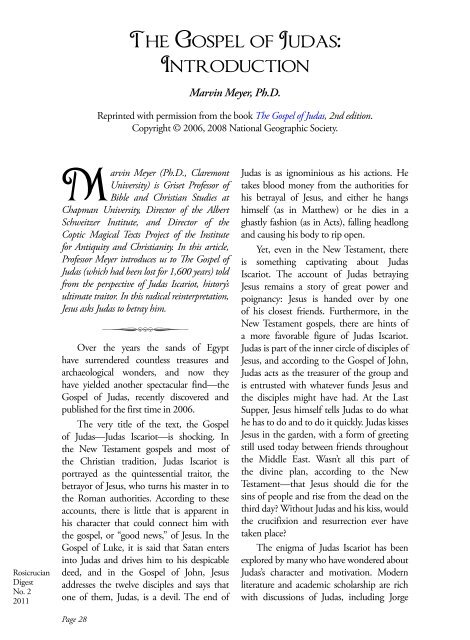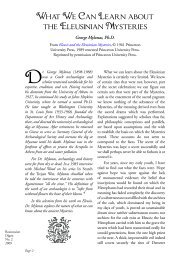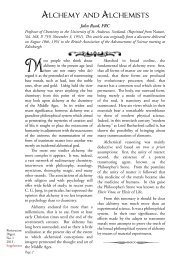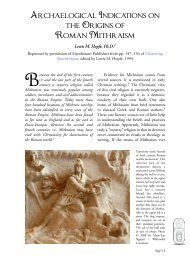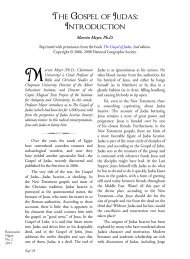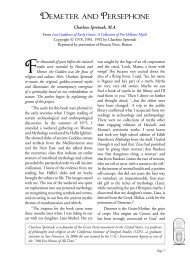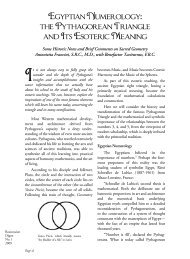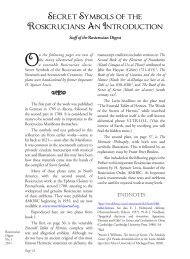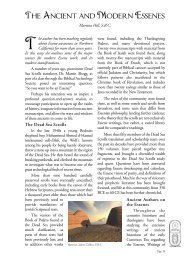Rosicrucian Digest Vol 89 No 2 2011 Gnosticism - Rosicrucian Order
Rosicrucian Digest Vol 89 No 2 2011 Gnosticism - Rosicrucian Order
Rosicrucian Digest Vol 89 No 2 2011 Gnosticism - Rosicrucian Order
You also want an ePaper? Increase the reach of your titles
YUMPU automatically turns print PDFs into web optimized ePapers that Google loves.
The Gospel of Judas:<br />
Introduction<br />
Marvin Meyer, Ph.D.<br />
Reprinted with permission from the book The Gospel of Judas, 2nd edition.<br />
Copyright © 2006, 2008 National Geographic Society.<br />
<strong>Rosicrucian</strong><br />
<strong>Digest</strong><br />
<strong>No</strong>. 2<br />
<strong>2011</strong><br />
Marvin Meyer (Ph.D., Claremont<br />
University) is Griset Professor of<br />
Bible and Christian Studies at<br />
Chapman University, Director of the Albert<br />
Schweitzer Institute, and Director of the<br />
Coptic Magical Texts Project of the Institute<br />
for Antiquity and Christianity. In this article,<br />
Professor Meyer introduces us to The Gospel of<br />
Judas (which had been lost for 1,600 years) told<br />
from the perspective of Judas Iscariot, history’s<br />
ultimate traitor. In this radical reinterpretation,<br />
Jesus asks Judas to betray him.<br />
Over the years the sands of Egypt<br />
have surrendered countless treasures and<br />
archaeological wonders, and now they<br />
have yielded another spectacular find—the<br />
Gospel of Judas, recently discovered and<br />
published for the first time in 2006.<br />
The very title of the text, the Gospel<br />
of Judas—Judas Iscariot—is shocking. In<br />
the New Testament gospels and most of<br />
the Christian tradition, Judas Iscariot is<br />
portrayed as the quintessential traitor, the<br />
betrayor of Jesus, who turns his master in to<br />
the Roman authorities. According to these<br />
accounts, there is little that is apparent in<br />
his character that could connect him with<br />
the gospel, or “good news,” of Jesus. In the<br />
Gospel of Luke, it is said that Satan enters<br />
into Judas and drives him to his despicable<br />
deed, and in the Gospel of John, Jesus<br />
addresses the twelve disciples and says that<br />
one of them, Judas, is a devil. The end of<br />
Page 28<br />
Judas is as ignominious as his actions. He<br />
takes blood money from the authorities for<br />
his betrayal of Jesus, and either he hangs<br />
himself (as in Matthew) or he dies in a<br />
ghastly fashion (as in Acts), falling headlong<br />
and causing his body to rip open.<br />
Yet, even in the New Testament, there<br />
is something captivating about Judas<br />
Iscariot. The account of Judas betraying<br />
Jesus remains a story of great power and<br />
poignancy: Jesus is handed over by one<br />
of his closest friends. Furthermore, in the<br />
New Testament gospels, there are hints of<br />
a more favorable figure of Judas Iscariot.<br />
Judas is part of the inner circle of disciples of<br />
Jesus, and according to the Gospel of John,<br />
Judas acts as the treasurer of the group and<br />
is entrusted with whatever funds Jesus and<br />
the disciples might have had. At the Last<br />
Supper, Jesus himself tells Judas to do what<br />
he has to do and to do it quickly. Judas kisses<br />
Jesus in the garden, with a form of greeting<br />
still used today between friends throughout<br />
the Middle East. Wasn’t all this part of<br />
the divine plan, according to the New<br />
Testament—that Jesus should die for the<br />
sins of people and rise from the dead on the<br />
third day? Without Judas and his kiss, would<br />
the crucifixion and resurrection ever have<br />
taken place?<br />
The enigma of Judas Iscariot has been<br />
explored by many who have wondered about<br />
Judas’s character and motivation. Modern<br />
literature and academic scholarship are rich<br />
with discussions of Judas, including Jorge


